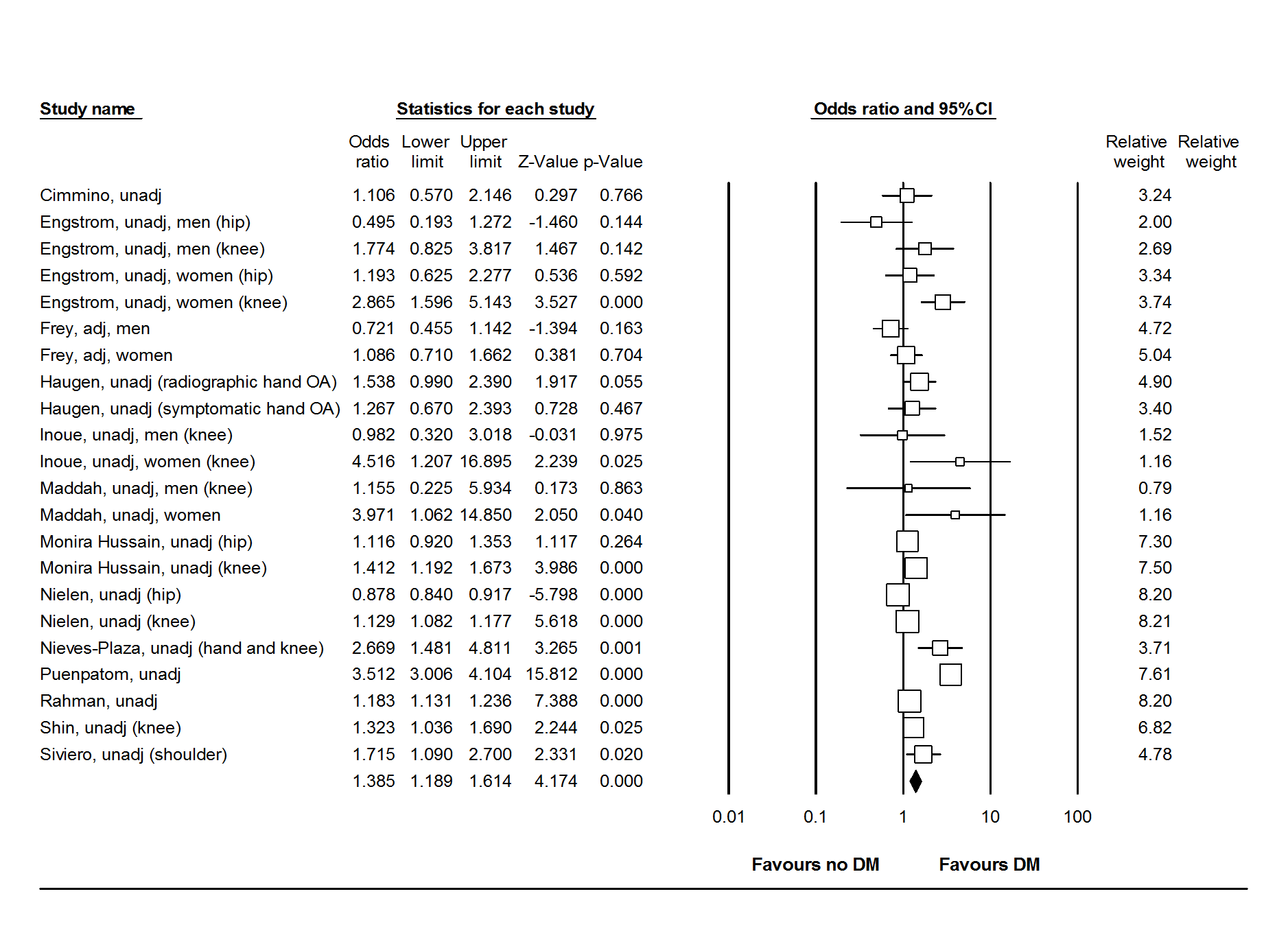Session Information
Session Type: ACR Poster Session B
Session Time: 9:00AM-11:00AM
Diabetes Mellitus is Not a Risk Factor for Knee Osteoarthritis, a Systematic Review and Meta-analysis
Background/Purpose: Obesity is a strong risk factor for both osteoarthritis (OA) and diabetes mellitus (DM). Reported associations between DM and risk of OA may be confounded by high body mass index (BMI). We conduct a systematic literature review on the risk of OA in relation to DM or hyperglycemia.
Methods: We performed PubMed and Web of Science database searches for relevant studies in the English literature published between 1966 to 22 Jan 2018. Searches focused on original research articles that gave information on the association between DM or hyperglycemia and the risk of onset or progression of osteoarthritis. Two meta-analysis model were performed for 1) risk estimate of DM comparing subjects with or without OA; and 2) risk estimate of OA, comparing people with or without DM. The risk estimates from studies that have been adjusted for BMI were utilized as far as available.
Results: From 270 publications, a total of 32 articles were reviewed, including 10 cross-sectional, 13 case-control and 9 cohort studies. The pooled population size in our systematic review was 386,516. 16 studies reported positive associations between DM and OA, while 16 studies reported null or inverse associations. Among studies that reported positive associations between DM and OA, only 62.5% had adjusted for BMI. For studies that reported null or inverse association between DM and OA, 100% had adjusted for BMI, of which 6 studies had comparable BMI at baseline between comparison groups. In meta-analysis model 1 pooling data from 13 studies and 307,473 subjects, there was an increased prevalence of DM comparing subjects with OA to those without OA (OR 1.385, 95% confidence intervals (CI): 1.189 – 1.614)(Figure 1). 92.3% of these studies did not adjusted for BMI. In model 2, pooling data from 21 studies and 391,203 subjects, there was no increased risk of onset or progression of OA, comparing subjects with DM to those without (OR 1.046, 95% CI: 0.923 – 1.186, p = 0.481)(Figure 2). 95.2% of these studies had adjusted for BMI. In sensitivity analyses, the risk of OA was not higher comparing subjects with or wihout DM as stratified by study design, gender, and site of OA.
Conclusion: This meta-analysis showed higher prevalence of DM among subjects with OA compared with those without. However, it does not support DM as an independent risk factor for OA. BMI was probably the most important confounding factor.
To cite this abstract in AMA style:
Hong C, Khor AYK, Ma CAPW, Hui LLY, Leung YY. Diabetes Mellitus Is Not a Risk Factor for Knee Osteoarthritis, a Systematic Review and Meta-Analysis [abstract]. Arthritis Rheumatol. 2018; 70 (suppl 9). https://acrabstracts.org/abstract/diabetes-mellitus-is-not-a-risk-factor-for-knee-osteoarthritis-a-systematic-review-and-meta-analysis/. Accessed .« Back to 2018 ACR/ARHP Annual Meeting
ACR Meeting Abstracts - https://acrabstracts.org/abstract/diabetes-mellitus-is-not-a-risk-factor-for-knee-osteoarthritis-a-systematic-review-and-meta-analysis/


